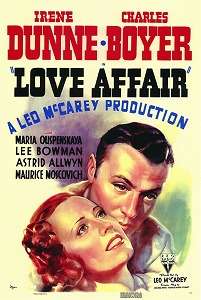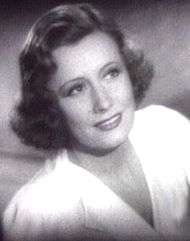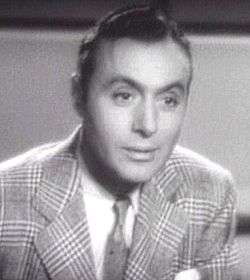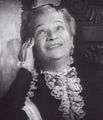Love Affair (1939 film)
Love Affair is a 1939 American romantic film starring Irene Dunne and Charles Boyer and featuring Maria Ouspenskaya. It was directed by Leo McCarey and written by Delmer Daves and Donald Ogden Stewart, based on a story by McCarey and Mildred Cram.[2] The movie was remade in 1957 as An Affair to Remember, and again with the original title in 1994. A Hindi-languaged version named Mann was released in India in 1999.
| Love Affair | |
|---|---|
 original film poster | |
| Directed by | Leo McCarey |
| Produced by | Leo McCarey |
| Screenplay by |
|
| Story by |
|
| Starring | |
| Music by | Roy Webb |
| Cinematography | Rudolph Maté |
| Edited by | |
Production company | RKO Radio Pictures |
| Distributed by | RKO Radio Pictures |
Release date |
|
Running time | 87 minutes |
| Country | United States |
| Language | English |
| Budget | $860,000[1] |
| Box office | $1.8 million[1] |
Plot
French painter Michel Marnet (Charles Boyer) meets American singer Terry McKay (Irene Dunne) aboard a liner crossing the Atlantic Ocean. They are both already engaged, he to heiress Lois Clarke (Astrid Allwyn), she to Kenneth Bradley (Lee Bowman). They begin to flirt and to dine together on the ship, but his notoriety and popularity on the ship make them conscious that others are watching. Eventually, they decide that they should dine separately and not associate with each other. At a stop at Madeira, they visit Michel's grandmother Janou (Maria Ouspenskaya), who approves of Terry and wants Michel to settle down.
As the ship is ready to disembark at New York City, the two make an appointment to meet six months later on top of the Empire State Building. Michel chooses six months because that is the amount of time he needs to decide whether he can start making enough money to support a relationship with Terry. When the rendezvous date arrives, they both head to the Empire State Building. However, Terry is struck by a car right as she arrives, and is told that she may not be able to walk, though that will not be known for certain for six months. Not wanting to be a burden to Michel, she does not contact him, preferring to let him think the worst. Meanwhile, Terry finds a job working at an orphanage teaching the children how to sing.
Six months go by, and during Terry's first outing since the accident, the two couples meet by accident at the theater, though Terry manages to conceal her condition. Michel then visits her at her apartment and finally learns the truth. He assures her that they will be together no matter what the diagnosis will be.
Cast
- Irene Dunne as Terry McKay
- Charles Boyer as Michel Marnet
- Maria Ouspenskaya as Grandmother Janou
- Lee Bowman as Kenneth Bradley
- Astrid Allwyn as Lois Clarke
- Maurice Moscovitch as Maurice Cobert, art dealer
- Scotty Beckett as Boy on Ship (uncredited)
- Ferike Boros as Terry's landlady (uncredited)
- Frank McGlynn Sr. as Orphanage Superintendent (uncredited)
 Irene Dunne
Irene Dunne Charles Boyer
Charles Boyer Maria Ouspenskaya
Maria Ouspenskaya Lee Bowman
Lee Bowman
Development
Despite the popularity of his romantic and screwball comedies, Leo McCarey had become tired of directing them.[3] His wife suggested that they should go on a cruising vacation around Europe to combat his writer's block, and when they returned to the United States, they watched the Statue of Liberty pass. McCarey immediately told her his idea about two passengers who fall in love on a cruise but realize that they are both "obligated to somebody else."[4] Actresses like Helen Hayes and Greta Garbo developed interest in starring but the McCarey couple preferred Irene Dunne, who had previously appeared in McCarey's The Awful Truth and was a close family friend.[5] Charles Boyer's reputation as a romantic actor (from starring in History is Made at Night and Algiers) made him McCarey's first choice.[5]
There was no official script when the movie went into production. Irene Dunne later noted that the dialog would change frequently and the cast would receive pieces of paper between filming; McCarey's common directing tactic of improvization also continued throughout.[6] However, McCarey gave Dunne the opportunity to choose the signature song for the movie, to which she decided upon "Wishing."[5] Maria Ouspenskaya described working on the film as "an atmosphere of work that is inspirational. [...] Actor, electricians, and cameramen loved their work and did not want to break away from that atmosphere."[7]
Reception
The praise for Love Affair among film critics reflected in Clark Wales' quip: "Recommending a Leo McCarey production is something like recommending a million dollars or beauty or a long and happy life. Any of these is a very fine thing to have and the only trouble is that there are not enough of them."[8] New York World-Telegram declared it "the most absorbing and delightful entertainment of its kind [in] a long time"[9] and another called the film "tender, poignant [and] sentimental without being gooey".[10]
On characterization, The New York Times wrote "the facility with which [Boyer and Dunne] have matched the changes of their script—playing it lightly with a superb utilization of the material at hand."[11] Leo Mishkin added: "Certainly, this Terry McKay of Miss Dunne's is one of the greatest things she has ever done on the screen[.]"[12] The only notable criticism of characters came from Dunne herself, who told Silver Screen years later: "If I had been in that girl's place, far from hiding, I would've trundled my wheelchair up and down the sidewalks of New York looking for [Michel]."[13]
Adaptations
Love Affair film was remade by McCarey in 1957 as An Affair to Remember with Cary Grant and Deborah Kerr in the lead roles, using a very similar screenplay, and by Glenn Gordon Caron in 1994 as Love Affair, starring Warren Beatty, Annette Bening and, in her last feature film, Katharine Hepburn.[14] A 1999 Bollywood movie titled Mann was made based on the same story.
Accolades
12th Academy Awards
- Nominations
- Outstanding Production: RKO Radio
- Best Actress: Irene Dunne
- Best Supporting Actress: Maria Ouspenskaya
- Best Writing (Original Story): Mildred Cram, Leo McCarey
- Best Art Direction: Van Nest Polglase, Al Herman
- Best Original Song: "Wishing," music and lyrics by Buddy DeSylva
Availability
In 1967, the film entered the public domain in the United States because the claimants did not renew its copyright registration in the 28th year after publication.[15] Because of this, the film is widely available on home video and online. The film can be downloaded legally for free on the Internet Archive.
References
- Richard Jewel (1994). "RKO Film Grosses: 1931-1951". Historical Journal of Film Radio and Television. 14 (1): 56.
- "Love Affair 1939". Turner Classic Movies. Retrieved May 22, 2016.
- Creelman, Eileen (November 3, 1937). "Leo McCarey Tells of Directing Irene Dunne in a New Comedy "The Awful Truth"". New York Sun.
However the public may feel about charmingly insane people on screen, Leo McCarey is fed up with them.
- Bogdanovich, Peter (1997). Who the Devil Made It: Conversations with Legendary Film Directors. New York: Bellantine Books. pp. 417–418.
- Gehring, Wes D. (2003). Irene Dunne: First Lady of Hollywood. pp. 100–103. ISBN 978-0810858640.
- Dunne, Irene (1972). "Interview with John Kobal". People Will Talk (Interview). Interviewed by John Kobal. Alfred A. Knopf (January 1, 1986).
- Crewe, Regina (March 19, 1939). "Mme Ouspenskaya, back from Coast, Offers Helping Hand to Fledglings". New York Journal.
- Clark Wales (March 1939). "Love Affair review". Detroit Free Press: Screen and Radio Weekly. p. 5.
- Boehnel, William (March 17, 1939). "Love Affair Seen as Outstanding Film". New York World-Telegram. p. 23.
- Cameron, Kate (March 17, 1939). "Exquisite Romance on Music Hall Screen". New York Daily News. p. 48.
- Nugent, Frank S. (March 17, 1938). "Love Affair". New York Times. p. 26.
- Mishkin, Leo (March 18, 1939). "Love Affair a Music Hall Winner; Irene Dunne, Charles Boyer Superb". The New York Telegraph. p. 2.
- Faith Service (1944). "My Screen Selves and I". Silver Screen. No. August 1944. pp. 60–61.
- "Love Affair 1994". Turner Classic Movies. Retrieved May 22, 2016.
- Pierce, David (June 2007). "Forgotten Faces: Why Some of Our Cinema Heritage Is Part of the Public Domain". Film History: An International Journal. 19 (2): 125–43. doi:10.2979/FIL.2007.19.2.125. ISSN 0892-2160. JSTOR 25165419. OCLC 15122313.
External links
| Wikimedia Commons has media related to Love Affair (film). |
- Love Affair at the American Film Institute Catalog
- Love Affair on IMDb
- Love Affair at Rotten Tomatoes
- Love Affair is available for free download at the Internet Archive
- Love Affair at the TCM Movie Database
- Love Affair at AllMovie
Streaming audio
- Love Affair on Lux Radio Theater: April 1, 1940
- Love Affair on Lux Radio Theater: July 6, 1942